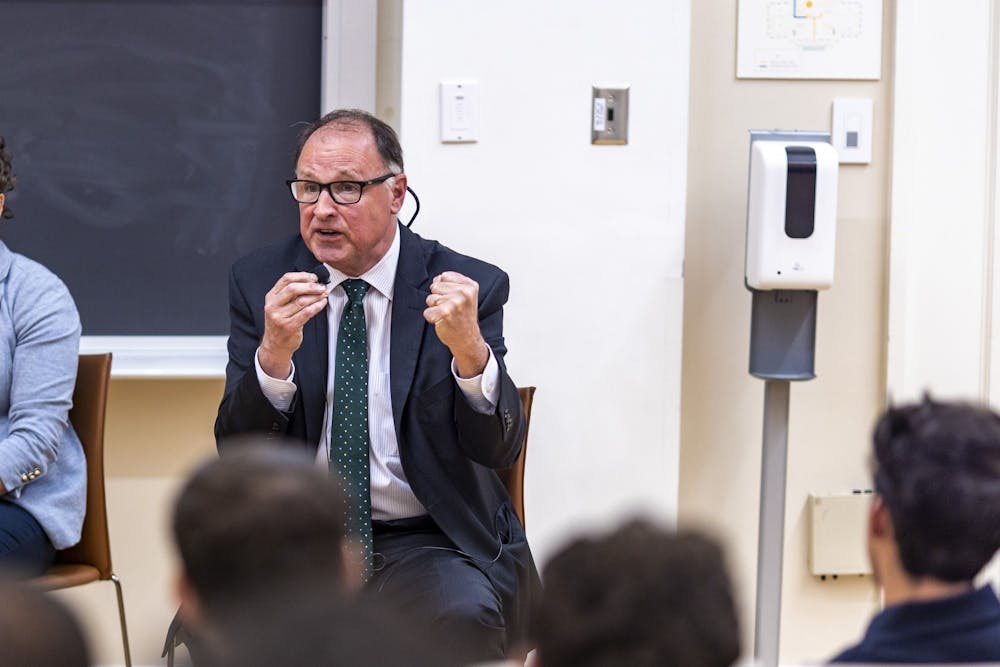The Board of Visitors responded last week to State Sen. Creigh Deeds, D-Charlottesville, who had sent an inquiry about the events leading up to former University President Jim Ryan’s resignation to the Board at the beginning of August. The University’s Aug. 29 letter was shared with The Cavalier Daily by an anonymous source.
The Aug. 29 letter, sent by Washington-based law firm Debevoise & Plimpton on behalf of the Board, addressed the University’s March decision to dissolve its Office of Diversity, Equity and Inclusion and the formation of a new presidential search committee. In the letter, the firm also declined to provide details about ongoing interactions with the Justice Department.
University Spokesperson Bethanie Glover confirmed that the Aug. 29 letter from Debevoise & Plimpton was sent to Deeds on behalf of the Board, with an attached statement from the presidential search committee.
Deeds sent a 46-question letter Aug. 1 to University Rector Rachel Sheridan and Vice Rector Porter Wilkinson pressing for answers on the University’s compliance with federal directives on DEI, its decision-making process surrounding the March 7 resolution and its interactions with the Justice Department. He also raised questions about the Board’s role regarding Ryan’s resignation.
Two weeks later, the University sent its first response to Deeds Aug. 15. According to Deeds, the University said in this letter that it could not provide full answers to his questions because of confidential negotiations with federal authorities.
Deeds said in an interview with The Cavalier Daily the Board’s decision to withhold information fell far short of what he expected from the state’s flagship university.
“The response was not adequate … it’s not good enough for me that they say they’re in private negotiations. That’s crap,” Deeds said. “I really want information. I was trying to get clarity on the issues that I think the public deserves.”
The Aug. 29 response was the Board’s second correspondence with Deeds. In the letter, Debevoise partner David A. O’Neil reiterated that the Board could not speak on negotiations and discussions with the Justice Department.
“The Board also recognizes your interest in matters relating to the U.S. Department of Justice and shares the desire for transparency that would provide closure to the University community and dispel incorrect narratives,” the letter read. “Although we would like to correct a number of inaccurate premises and assumptions in your letter, we are duty-bound to place the University’s interests above all else, and we must honor our fiduciary obligation to the University.”
Deeds pushed back on that explanation, arguing the University was accepting the Trump administration’s legal framing.
“They’re taking a view that the Trump Justice Department has the right interpretation of the law. No, I don’t think that’s correct,” Deeds said.
Deeds also criticized the University’s reliance on outside counsel and the substance of its response. He said that the Board failed to answer 38 out of 46 of his questions.
Instead, the response focused on two areas. First, it defended the March 7 resolution, which formally dissolved the University’s Office of DEI and committed the University to ensuring its policies comply with federal civil rights law.
“The March 7 Resolution resulted from a collaborative process involving the Board, led by then-Rector Hardie, and President Ryan’s senior leadership team at the University. The unanimous adoption of the Resolution by the Board reflected, among other things, a recognition by all involved that the action was necessary to comply with federal and state law and fulfill the Board’s fiduciary duties,” the letter read.
The action followed directives from the Trump administration and Virginia Secretary of Education Aimee Guidera, warning institutions could risk federal funding if they failed to comply.
Ryan subsequently created a working group to oversee compliance with the March 7 resolution. According to the letter, he assembled the group March 19, and it first met March 24 to begin reviewing University programs for compliance with federal civil rights law. An April 7 update to the Board reported that the group had completed an initial review, launched a more detailed compliance review and dissolved the Division of DEI. Ryan later submitted a more extensive report April 28 on the group’s progress.
The Cavalier Daily has requested the April 7 and April 28 reports, but the University has declined to produce these documents on multiple occasions.
The Board proceeded to adopt a resolution at an April 29 meeting titled, “Advancing Free Inquiry and Viewpoint Diversity at U.Va.” This resolution established a new working group that would, according to the letter, “consider efforts to promote open inquiry, constructive conversation across differences, and development of a civic mindset.”
The Aug. 29 letter also addressed the appointment of a 28-member presidential search committee — one of the issues Deeds raised in his Aug. 1 letter. In that letter, Deeds pointed to no-confidence resolutions from the Faculty Senate and the General Faculty Council, which urged the Board to include them in the search process. He pressed the Board on whether it valued shared governance and how it interpreted the significance of having lost the confidence of faculty.
In its reply, the Board emphasized that the Special Committee, appointed July 25, is composed of students, faculty, staff, alumni and Board members and met for the first time Aug. 22. The letter claimed that the Special Committee is more inclusive and representative than any previous presidential search committee at the University.
Deeds added that the Board’s approach reflects undue influence from federal and state political directives.
“I’m so concerned that the independence of that system has been compromised,” Deeds said. “I just want some answers, and I’m not getting them yet.”
The senator said the next steps will depend heavily on the outcome of Virginia’s upcoming gubernatorial election, which could shape how much oversight the General Assembly exercises over the Board.







